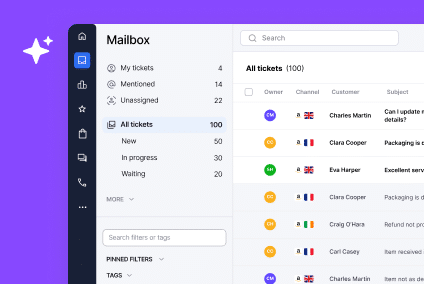Artificial intelligence is fundamentally transforming how eCommerce businesses handle customer support in 2026. As online shopping continues to dominate retail, customers expect instant responses, personalized assistance, and seamless support across every channel where they shop.
The challenge for eCommerce sellers is clear: manage increasing support volumes across multiple marketplaces and storefronts while maintaining quality and speed. Generic customer service platforms simply don’t cut it anymore. They lack the marketplace-specific features, order context, and eCommerce workflows that online retailers need.
This guide focuses exclusively on AI-powered tools built for eCommerce. We’re not covering generic helpdesks or SaaS support platforms. Instead, you’ll discover solutions designed specifically for online sellers who need to manage customer conversations from Amazon, eBay, Shopify, TikTok Shop, and other sales channels in one unified workspace.
What Makes a Customer Service Tool eCommerce-Focused?
Not all customer support platforms are created equal, especially when it comes to serving eCommerce businesses. Here’s what separates purpose-built eCommerce tools from generic helpdesks:
Native Marketplace Integrations The best eCommerce support tools connect directly with major marketplaces like Amazon, eBay, Walmart, and emerging platforms like TikTok Shop. This means your team can respond to buyer messages without switching between seller portals, and all conversations sync automatically.
Storefront Platform Support Seamless integrations with Shopify, BigCommerce, WooCommerce, and other eCommerce platforms allow support teams to access order details, customer history, and product information right within the support ticket.
Order-Aware Intelligence eCommerce-focused tools understand the context of each inquiry. They can automatically pull order details, shipping status, and product information, enabling your team to resolve issues faster without asking customers for their order numbers.
AI Features Built for Online Retail Generic AI chatbots aren’t enough. eCommerce tools need smart routing based on order status, sentiment detection to prioritize unhappy customers, automated tagging for common issues like returns or shipping delays, and AI-generated responses that understand product catalogs and fulfillment workflows.
Top 5 AI-Powered eCommerce Customer Support Tools
1. eDesk
Best For: Multichannel eCommerce sellers managing support across marketplaces and storefronts
AI Features:
- Smart ticket summaries that instantly show order context and conversation history
- Automated tagging and categorization for faster routing
- AI-powered auto-responses for common questions
- Sentiment analysis and escalation detection
- Intelligent workflow automation based on ticket patterns
- Multilingual support with AI translation
eCommerce Integrations: eDesk connects natively with over 200 channels, including Amazon, eBay, Walmart, TikTok Shop, Shopify, WooCommerce, BigCommerce, Magento, and major social media platforms. Every integration is purpose-built for eCommerce, pulling in order data, customer history, and product details automatically.
Pros:
- Purpose-built for eCommerce with deep marketplace understanding
- Unified inbox consolidates all customer conversations
- Order context displayed automatically in every ticket
- Powerful automation rules reduce repetitive work
- Advanced analytics tailored for online retail metrics
- Supports high-volume sellers with enterprise-grade infrastructure
Cons:
- More features mean a slight learning curve for new users
- Premium AI capabilities require higher-tier plans
Pricing: Plans start with a free trial available. Book a demo to discuss custom pricing based on your ticket volume and channel needs.
eDesk stands out because it’s the only platform in this list built exclusively for eCommerce from the ground up. While other tools have added marketplace integrations as afterthoughts, eDesk’s entire architecture is designed around the unique workflows of online sellers. This means faster setup, better automation, and support teams that can actually resolve issues without constantly switching tabs or asking customers for basic information that should already be available.
2. Tidio
Best For: Small eCommerce stores wanting simple live chat with AI automation
AI Features:
- Lyro AI chatbot for automated conversations
- Pre-built automation templates
- Visitor tracking and behavioral triggers
- Basic sentiment analysis
eCommerce Integrations: Tidio connects with Shopify, WooCommerce, BigCommerce, and other major eCommerce platforms. However, marketplace integrations like Amazon and eBay are limited or require third-party workarounds.
Pros:
- Easy setup with minimal technical knowledge required
- Affordable pricing for small businesses
- Clean, intuitive interface
- Good for website chat and basic automation
Cons:
- Limited marketplace support (no native Amazon, eBay integration)
- AI features less sophisticated than specialized eCommerce tools
- Order context features not as robust
- May require multiple tools for multichannel support
Pricing: Free plan available with limited features. Paid plans start at $29/month.
3. Zendesk (with eCommerce Extensions)
Best For: Large enterprises with existing Zendesk infrastructure adding eCommerce support
AI Features:
- Advanced AI agents with natural language understanding
- Intelligent routing and triage
- Automated responses and workflows
- Predictive analytics and insights
- AI-powered knowledge base suggestions
eCommerce Integrations: Zendesk offers eCommerce integrations through its marketplace apps and APIs. Connections to Shopify, Magento, and other platforms are available, though marketplace integrations often require third-party apps or custom development.
Pros:
- Robust enterprise-grade platform
- Sophisticated AI capabilities
- Extensive customization options
- Strong reporting and analytics
Cons:
- Not built specifically for eCommerce workflows
- Complex setup and configuration
- Higher cost, especially when adding eCommerce apps
- Marketplace integrations not as seamless as purpose-built tools
- Steeper learning curve for support teams
Pricing: Plans start at $55 per agent/month. eCommerce apps and advanced AI features add significant costs.
4. Richpanel
URL: https://www.richpanel.com/
Best For: Growing eCommerce brands focused on self-service and customer portals
AI Features:
- AI-powered self-service portal
- Automated order tracking updates
- Smart chatbot for common queries
- Predictive ticket routing
- Automated workflow triggers
eCommerce Integrations: Richpanel integrates with Shopify, WooCommerce, BigCommerce, Magento, and Recharge. The platform emphasizes deep Shopify integration but has limited native support for major marketplaces like Amazon and eBay.
Pros:
- Strong self-service capabilities reduce ticket volume
- Customer portal with order management
- Good for Shopify-focused businesses
- Competitive pricing for mid-market brands
Cons:
- Limited marketplace integrations
- AI features not as advanced as specialized platforms
- Better suited for DTC brands than multichannel sellers
- Fewer automation options for complex workflows
Pricing: Plans start at $300/month for up to 3 agents.
5. ChannelReply
URL: https://www.channelreply.com/
Best For: Amazon-focused sellers needing marketplace message management
AI Features:
- Basic automated responses
- Smart routing based on marketplace
- Template management with variables
- Rule-based automation
eCommerce Integrations: ChannelReply specializes in marketplace integrations, particularly Amazon, eBay, and Walmart. It also connects with Shopify and other eCommerce platforms, with a focus on consolidating marketplace messages.
Pros:
- Strong Amazon and marketplace focus
- Consolidates messages from multiple seller accounts
- Good for businesses heavily dependent on marketplaces
- Helps maintain marketplace performance metrics
Cons:
- AI features are basic compared to other platforms
- Limited advanced automation capabilities
- Interface not as modern as competitors
- Fewer features for omnichannel customer experience
Pricing: Custom pricing based on message volume and channels.
Comparison Table
| Tool | AI Features | Marketplaces Supported | Store Integrations | Best For |
| eDesk | Smart summaries, auto-tagging, auto-responses, sentiment analysis, escalation detection, multilingual AI | Amazon, eBay, Walmart, TikTok Shop, 200+ channels | Shopify, WooCommerce, BigCommerce, Magento, and more | Multichannel eCommerce sellers needing comprehensive marketplace support |
| Tidio | Lyro AI chatbot, behavioral triggers, basic sentiment analysis | Limited (requires workarounds) | Shopify, WooCommerce, BigCommerce | Small stores focused on website chat |
| Zendesk | Advanced AI agents, intelligent routing, predictive analytics | Via third-party apps | Shopify, Magento (via apps) | Large enterprises with complex needs |
| Richpanel | Self-service AI, automated tracking, smart chatbot | Limited marketplace support | Shopify, WooCommerce, BigCommerce, Magento | DTC brands prioritizing self-service |
| ChannelReply | Basic automated responses, rule-based automation | Amazon, eBay, Walmart | Shopify and basic platforms | Amazon-centric sellers |
Benefits of Using AI in eCommerce Support
Implementing AI-powered customer service tools delivers measurable advantages for online retailers:
24/7 Automated Support Reduces Cart Abandonment AI chatbots can answer common questions about shipping, returns, and product details instantly, even outside business hours. When customers get immediate answers during the buying process, they’re more likely to complete their purchase. According to recent industry research, businesses using AI support see up to 30% reduction in cart abandonment rates.
Personalized Responses Improve Customer Experience Modern AI doesn’t just provide generic responses. It understands order history, past conversations, and customer preferences to deliver personalized assistance. This creates a better experience that feels human, even when automated. Customers appreciate getting relevant answers without repeating information.
Agent Productivity Through Smart Workflows AI handles the repetitive tasks, like answering “Where is my order?” or providing return instructions, while your human agents focus on complex issues requiring empathy and problem-solving. Features like smart summaries and auto-tagging mean agents spend less time reading through long conversation histories and more time actually helping customers. Many eCommerce businesses report 40-50% improvements in agent efficiency after implementing AI support tools.
Data-Driven Insights for Operations and Product Teams AI tools analyze thousands of conversations to identify trends, common pain points, and opportunities for improvement. You’ll discover which products generate the most questions, which policies confuse customers, and where your fulfillment process breaks down. These insights help you make better decisions across your entire operation, from product development to warehouse management.
Ready to see how AI can transform your eCommerce support operations? Try eDesk free or book a personalized demo to explore features tailored to your business needs.
Frequently Asked Questions (FAQs)
Why is eDesk better for eCommerce than generic helpdesks?
eDesk is purpose-built exclusively for eCommerce businesses, with native integrations for over 200 marketplaces and storefronts. Unlike generic helpdesks that treat every ticket the same, eDesk automatically displays order details, customer history, and product information in every conversation. This order-aware approach means your support team can resolve issues faster without asking customers for basic information. The AI features understand eCommerce workflows like returns, refunds, and shipping delays, while generic tools require extensive customization to handle these scenarios effectively.
Can AI handle product returns and order issues?
Yes, modern AI tools can manage many aspects of returns and order issues. AI chatbots can provide return policy information, generate return labels, and update customers on order status automatically. However, complex situations involving damaged products, custom orders, or policy exceptions still benefit from human oversight. The best approach combines AI for routine cases with smart escalation to human agents when necessary. Tools like eDesk use sentiment analysis to detect frustrated customers and prioritize their tickets for immediate human attention.
Do these tools integrate with Shopify and Amazon?
Integration capabilities vary significantly. eDesk offers native integrations with both Shopify and Amazon, along with eBay, Walmart, TikTok Shop, and hundreds of other channels. Tidio and Richpanel connect well with Shopify but have limited or no native Amazon integration. Zendesk requires third-party apps for most eCommerce integrations. ChannelReply focuses primarily on marketplaces like Amazon and eBay. For multichannel sellers, choosing a platform with robust native integrations saves significant time and reduces the risk of missing messages.
Is AI support safe and accurate?
When implemented properly, AI support is both safe and accurate. Reputable platforms use supervised learning and maintain quality controls to ensure responses meet brand standards. However, it’s important to start with AI handling simple, factual queries and gradually expand as you gain confidence. Always review AI-generated responses during setup and use features like required human approval for sensitive situations. The tools in this guide all include safeguards, confidence scoring, and the ability to route uncertain cases to human agents automatically.
What is the ROI of AI in customer service?
eCommerce businesses typically see ROI from AI customer service tools within 3-6 months. The returns come from multiple sources: reduced labor costs through automation (handling 30-50% of simple queries without human intervention), increased sales from 24/7 availability reducing cart abandonment, improved customer lifetime value from faster resolution times, and better agent retention from eliminating repetitive work. Many eDesk customers report saving 15-20 hours per week per agent while simultaneously improving customer satisfaction scores. For a detailed ROI analysis specific to your business, consider booking a consultation with solution experts who can assess your current support volume and costs.
Choose the Right AI Support Tool for Your eCommerce Business
The landscape of AI-powered customer service has matured significantly in 2026, offering eCommerce businesses powerful options to scale support without sacrificing quality. The right choice depends on your specific needs, whether you’re a small Shopify store, a growing multichannel seller, or an enterprise managing thousands of daily conversations across dozens of sales channels.
For most eCommerce businesses, especially those selling across multiple marketplaces and storefronts, eDesk provides the most comprehensive solution with its purpose-built architecture, extensive integrations, and sophisticated AI features designed specifically for online retail workflows. The platform’s ability to consolidate all customer conversations while maintaining full order context sets it apart from generic helpdesks retrofitted for eCommerce.
Start exploring what AI can do for your customer service operations. Try eDesk free for 14 days with no credit card required, or schedule a personalized demo to see the platform in action with your actual data.




